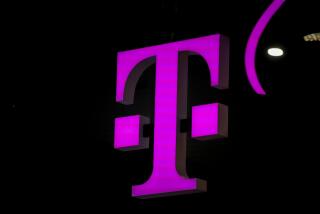Consumers already winners in auction
- Share via
WASHINGTON — Although a major auction of prime public airwaves is far from finished, there already appears to be a big winner: the U.S. consumer.
A huge swath of the wireless spectrum as part of the nation’s transition to digital TV broadcasts met its $4.6-billion minimum price Thursday. That means controversial new rules forcing the winning company to allow consumers to use any device or application on those airwaves will go into effect.
The rules, advocated by Google Inc. and a coalition of consumer and public interest groups, will help pry open traditionally closed wireless networks that prevent people from taking their phones with them when switching providers.
Total bids for all the spectrum reached $15.6 billion, which will be deposited in the U.S. treasury, guaranteeing that Congress will raise more than the $10 billion it hoped for.
The auction, which is being conducted by the Federal Communications Commission, is expected to take weeks to complete.
“The amount of activity that we’ve already seen occurring demonstrates just how significant the interest is in this piece of spectrum,” FCC Chairman Kevin J. Martin said.
The airwaves, which are being given up by TV broadcasters next year when they switch to all-digital signals, are ideal for carrying data over long distances and through walls. Federal officials expect them to be used for wireless high-speed Internet access.
Google, AT&T; Inc. and Verizon Communications are among 214 qualified bidders for nearly 1,100 licenses to pieces of the spectrum that vary from a nationwide swath to regional slivers.
Because of strict rules to prevent collusion, bidders won’t be identified until the auction ends, and companies are forbidden from commenting on their activity. Based on the limited bidding information available, Verizon is probably the high bidder on the open-access chunk, but Google is also a possibility, said Blair Levin, an analyst at brokerage Stifel, Nicolaus & Co.
So far, public safety organizations are the big losers in the complex online auction, which began Jan. 24 and has gone 21 rounds. A swath of spectrum set aside to help form a public-private network enabling police, firefighters and other emergency personnel to share information did not receive its $1.3-billion minimum bid. The only bid was for $472 million in the first round.
Frontline Wireless, a high-profile start-up once considered the front-runner for the spectrum, folded last month.
If the minimum bid isn’t reached, the FCC could lower it or change rules for building the network and re-auction the spectrum.
But Martin noted that the last auction, in 2006, went 161 rounds. He remained optimistic a company would meet the minimum bid.
--







